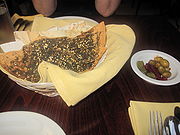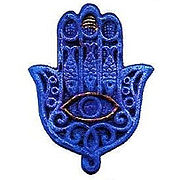From The Peopling of New York City
Contents |
Interview #1 - Rachel Stein
1) When and why did your family decide to come to America?
"My father came here in 1961; he brought the rest of us there two years later in 1963, when I was 14 years old. At that time there were constant wars and my father kept getting drafted, and when he wasn't serving the army he was working three jobs. He planned to go to America for a short time to stay by relatives, make some money, and bring it back here, but he ended up staying for two years. It was made to avoid all the hardships of living in the Middle East at the time and to have opportunities."
2) What foods do you see as important to your culture?"Falafel, salads, schnitzel. Many foods are also garnished heavily with parsley and cooked with lots of lemon juice."
3) What cultural traditions do you and your family keep here that you have taken from the Middle East?
"We still practice many holidays here, and we still speak Hebrew to one another. I still make many of the same dishes I used to eat there, the house is decorated with lots of traditional Israeli pictures, when it's warmer I even dress similar to the way I did there."
4) Do you see more things relating to your culture (stores, restaurants, etc) popping up since your family arrived here?
"There have been more Middle Eastern food places opening up recently. Also, there are more businesses - grocery stores, the hair salon I go to - that are owned and run by Israelis who I can speak Hebrew to. Also, American girls picked up the Israeli fashion of wearing shorter skirts in recent years, when I came here it made me an outcast but now its normal."
Interview #2 - Dina Margalit
1) When did your family decide to come to America?
'I came to America on October 1, 1960. I was not quite 12, just a few months shy."
2) What made you decide to come to America?
"I came here because my father was a Holocaust survivor with no family left, and my mother found out we may be displaced (after the Holocaust Jews who were left without homes or families were considered "displaced") and they ended up moving to Israel where I was born. When our American relatives found out we lived in Israel, they contacted us and began trying to get us here. So it was just for family."
3) What cultural traditions do you and your family keep here that you have taken from the Middle East?
"I would say yes, the way we practice the holidays, we celebrate the way we did at home rather than the American way. We also still celebrate Israeli Independence Day here and I speak to friends in Hebrew. I also cook many of the same dishes I made in Israel and shop at Israeli stores and get products brought here from Israel. We also have the hand that hangs on the walls of many Israeli homes. There's a lot of reminders here."
4) Do you see more things relating to your culture (stores, restaurants, etc) popping up since your family arrived here?
"What really reminds me of the Middle East is really the fact that I still have most of my friends that I met here and speak Hebrew to and whatnot. It's more that we just remind ourselves that we are Israelis too. I mostly see the Israeli store, the way they sell and package things reminds me of how they did in Israel, that's about it."
Interview #3 - Amira Hassan-Ibrahim
1) When did your family decide to come to America?
"My family came to America when I was 11 years old (I'm 18.. turning 19, so that's almost 8 years), I believe it was December of 2001."
2) What made you decide to come to America?
"My family decided to come here because my parents were looking for a "better" life, I know it sounds like the typical move or the popular answer when this question is asked. But my parents' idea of a "better" life was quit complicated. My dad was already in America for some time before we moved as a family. My mother, who was already a Medical Doctor, was the one who pushed for the entire family to move.. She was planning on pursuing her Medical career here (after countless difficulties, she made her dreams a reality.. my mother is now a doctor in the US). It was a move for the betterment of everyone in my family."
3) What cultural traditions do you and your family keep here that you have taken from the Middle East?
"The always celebrate the holidays (religious ones), because in the Middle East, without a doubt, religion crosses over and impacts the culture greatly. Some of the holidays we celebrate Ramadan, Eid etc. (all the Muslim holidays). Culturally, women dress conservatively (but not too conservative) The 'new' Egyptian culture leans very much towards the Western culture. We still like to eat the same food.. Back in Egypt, on a Friday (which is the equivalent to the American Sunday, mostly for Islamic reasons) My family in Egypt would wake up very early and prepare a huge breakfast. It consisted of beans, fallafels, pita bread, mixed pickles, tehini (sesame paste, very yummy! It's more like a dressing), cheese, and tea with milk. It's the biggest meal yet the most simple. We tend to have this traditional Egyptian meal every once in a while. Whenever we can."
4) Do you see more things relating to your culture (stores, restaurants, etc) popping up since your family arrived here?
"Yes without a doubt I see more things relating to my culture. One of which is Hookah.. It's become a thing "to do", in Egypt everyone thinks it's funny that Americans have taken Hookah smoking to the extremes and consider it a leisure activity. Hookah is typically for men and they'd smoke it in place of cigarettes and usually smoke it on a daily basis. My family consists of non-smokers, but many Egyptians take pride in their Hookah. On Staten Island alone, I've personally been to countless hookah bars. Some of which are called 101 cafe, 1001 Arabian Nights, and Aladdin.. My personal favorites are in the city, my favorite one is called Horus.. which is derived from the Egyptian eye of Horus.. as you can notice the other Hookah bars are named after Egyptian "things".. So yeah that's one MAJOR thing, and i think you can agree."
Interview #4 - Margie Kuper
1) When did your family decide to come to America?
"1960."
2) What made you decide to come to America and leave Egypt?
"Left in 1956 because we were deported. They put my father in prison as a political prisoner, plus we were Jewish and they didn't like Jews at the time. The population had nothing against the Jews, it was really among political leaders. This was around when King Farouk was an abusive leader, then Nassar and his whole group took over and started saying how Jews were owning everything and started a war. Also, the Suez Canal War was taking place, and the United States were sent there to basically help citizens in need. We ended up getting sent to Italy and then France with no money, clothes, nothing. Finally we went to America to try to get money and opportunity and freedom to be Jews."
3) What cultural traditions do you and your family keep here that you have taken from Egypt?"All our foods are still made like we did in Egypt, its very similar to Mediterranean foods (israeli, Greek). I'm still very superstitious like the Arabs are, we still have the hand of G_D around the house , we believe in using blue ribbons for good luck like the do in Egypt (said to ward off the evil). My father didn't want my mother to work because that is tradition in Egypt. I still do a lot of cursing in Arabic, many Israeli Jews actually curse in Arabic."
4) Do you see more things relating to your culture (stores, restaurants, etc) popping up since your family arrived here?
"Yeah. Actually, in Staten Island we went to a place recently and a majority of the waiters were from Egypt. Alot more Egyptians are doing low-level jobs. In Florida i'm seeing more muslims, more mosques being built, and many Arabic food places but I'm not sure if those are Egyptian."

